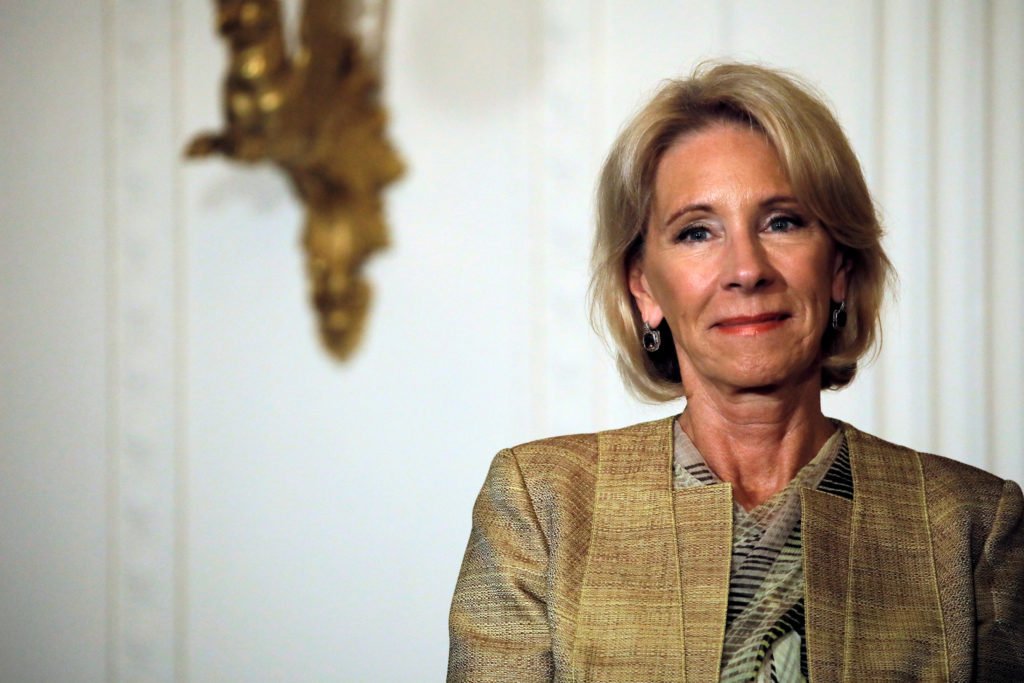
The U.S. Department of Education on Thursday released the final version of federal regulations covering accreditation and the state authorization of online education providers.
The 519-page rule will take effect in July 2020. It hews closely to the recommendations a group of 15 department-chosen federal negotiators agreed to in April. The process, while often contentious, led to the first consensus in a negotiated rule-making session on federal education policy in nearly a decade.
The department said it would soon publish proposed rules on related consensus agreements on issues related to distance education and innovation, federal grants for teachers and religious colleges’ eligibility for federal financial aid.
Consumer groups, think tanks and congressional Democrats criticized the final rules for accreditors. The regulations roll back key protections for students and taxpayers, they said, and will result in the “unraveling of federal oversight of college quality,” according to the left-leaning Center for American Progress.
The regulations are part of the broader “rethink higher education” agenda led by Betsy DeVos, the U.S. secretary of education.
DeVos said the Trump administration’s final rules for accreditors are designed to “rightsize bureaucracy” and will help students pursue valuable postsecondary credentials and transfer credits between institutions.
“These final regulations demonstrate our commitment to working with student, state, employer and institutional representatives to develop sound policies that serve the best interests of students,” DeVos said in a written statement. “These reforms are necessary to bring higher education into the current century, to be more responsive to the needs of students, and to reduce the skyrocketing cost of higher education.”
The department said requirements for accreditors, which monitor colleges and serve as the gatekeepers to federal financial aid, were revised so the agencies will “be less prescriptive and provide greater autonomy and flexibility to facilitate agility and responsiveness and promote innovation.”
Rep. Bobby Scott had a different take.
“Students and parents view college accreditation as a seal of approval from the federal government,” Scott, the Virginia Democrat who chairs the House education committee, said in a written statement. “By rolling back standards for accreditors, the department is undermining a key driver of institutional accountability, further exposing students and taxpayers to fraud and abuse at the hands of low-quality schools.”
Authorizing online programs
The panel of 15 negotiators included members from higher education industry groups, regional and national accrediting agencies, and two representatives for students.
The Trump administration’s initial proposal for negotiators drew rebukes from regional accreditors and consumer groups alike. Among the most controversial aspects were plans to limit the scope of regional accreditors, to drop the credit-hour standard and to allow the outsourcing of academic operations to non-accredited entities, which is currently limited to 50 percent of a program.
The department backed off those and other proposals. And the final rules changed little from the consensus agreement. The department received 195 public comments about the proposed regulations but made few changes in response to those comments.
However, consumer groups said the Trump administration dropped a key part of the state authorization regulations, which they said was an important part of the consensus agreement.
The complex Obama-era rules were set to go live last year but were delayed by the department over complaints about confusion over how to implement them. They went into effect in May, but some confusion continues.
Put simply, the rules would require online providers to document that they are authorized to operate in any state where enrolled students live. States can participate in reciprocity agreements, however, where they waive their own rules and follow agreed-upon national standards for interstate distance and online education. Currently, for example, 49 states and the District of Columbia participate in the State Authorization Reciprocity Agreement (SARA).
During the rule-making process, negotiators sparred over whether such agreements should allow participating states to enforce their own higher education regulations, over and above the reciprocity agreement. Some argued that this language from the Obama-era rule is good for consumer protection.
The panel voted to keep the 2016 definition of a reciprocity agreement. But the caveat allowing states to enforce their own laws and regulations under the agreement disappeared from the final rule, said Clare McCann, deputy director for federal higher education policy at New America.
“The agreement in the room, which the department also agreed to, was to stick to those reciprocity agreements,” she said.
The department said the final rules on state authorization expand consumer protection while narrowing bureaucratic reporting requirements. It also said the rules clarify that while states may “no longer layer” additional higher education authorization requirements on top of reciprocity agreements, they can still enforce their own “general-purpose state laws and regulations outside of the state authorization of distance education” under the new regulations.
“The rules allow colleges and universities to focus their resources on the students rather than complex regulatory requirements and costly fees,” the department said.
The Institute for College Access & Success criticized both the accreditation and state authorization components of the rule. For example, the group said the department “deleted assurances” that students can file complaints about online providers with their own states, as well as the state in which their college is located.
“In the end, this horror show is a nightmare for students who will be put at greater risk of predatory colleges leaving them deep in debt,” TICAS said in a statement, which riffed on the Halloween release of the rules.
Streamlined or weakened?
The new rules for accreditors will allow colleges to get quicker approvals from the agencies for changes to their academic programs, as well for the feds to move faster in recognizing new accreditors.
They also give the agencies more discretion with sanctions for colleges that are deemed to be out of compliance with their standards.
For example, the rules allow accreditors in some cases to take up to four years to impose sanctions, up from the current maximum of two years, which Trump administration officials have said is too short for colleges to make necessary improvements.
“Accreditation tends to be a race to the bottom,” said McCann. “We will see bad schools for much longer under the rules.”
Also controversial is the department’s move to allow colleges to offer new academic programs and create new branch campuses without certain approvals from their institutional accreditors.
“Loosening these rules raises the risk that colleges will again abuse loopholes to quickly scale up or fundamentally change operations without meeting quality standards,” Antoinette Flores, associate director for postsecondary education at the Center for American Progress, wrote in April.
The Council of Regional Accrediting Commissions said in a written statement that the final rules “largely maintain the integrity of the consensus” reached by negotiators, including Barbara Gellman-Danley, the group’s chair and president of the Higher Learning Commission. The seven regional accrediting agencies said they will update their policies in coming months to align with the new requirements.
“Over all, regional accreditors expect the regulations will support our ongoing efforts to promote student success, strengthen outcomes and encourage flexibility and innovation in higher education,” a C-RAC spokesperson said in a statement. “Additionally, the regulations will streamline accreditation and recognition processes, helping to reduce costs and unnecessary paperwork and allowing a stronger focus on institutional quality and improvement.”
[“source=pbs”]





